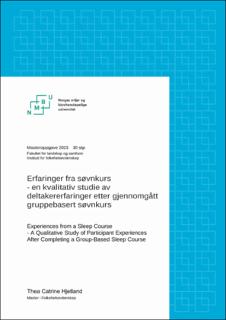| dc.contributor.advisor | Hilde Sylliaas | |
| dc.contributor.author | Hjetland, Thea Catrine | |
| dc.date.accessioned | 2023-07-18T16:28:06Z | |
| dc.date.available | 2023-07-18T16:28:06Z | |
| dc.date.issued | 2023 | |
| dc.identifier | no.nmbu:wiseflow:6839537:54591913 | |
| dc.identifier.uri | https://hdl.handle.net/11250/3079898 | |
| dc.description.abstract | Bakgrunn: I Norge er søvnvansker en av de vanligste helseutfordringene, og beskrives som et folkehelseproblem. Omtrent hver tredje nordmann strever med søvn ukentlig, og omtrent 15% oppfyller kriteriene for insomni. Søvnmangel påvirker humør, konsentrasjon og overskudd, og kan forårsake både psykiske og fysiske lidelser. Ikke-medikamentell behandling er anbefalt ved insomni, og Helsedirektoratets søvnkurs-mal, «Sov godt», kan benyttes som behandlingstilbud mot søvnvansker og insomni. Frisklivssentralen i den studerte kommunen tilbyr gruppebaserte søvnkurs som baserer seg på «Sov godt».
Hensikt: Formålet med denne studien var å undersøke hvilke erfaringer mennesker har etter deltakelse på gruppebasert søvnkurs.
Metode: Studien benyttet en kvalitativ tilnærming med fokusgruppeintervju som metode. Studiens funn ble analysert ved bruk av en tematisk analyse hvor informantenes erfaringer ble identifisert og systematisert.
Funn: Tre informanter deltok i fokusgruppeintervjuet, og samtlige hadde deltatt på søvnkurs ved den studerte frisklivssentralen tidligere. Alle informantene delte et ønske om å endre egen situasjon, men informantene hadde ulik grad av motivasjon og tro på endring. Informantene erfarte at både økt kunnskap og en opplevelse av fellesskap med likesinnede, bidro til å sette egen situasjon i perspektiv. Ved kursslutt hadde informantene ulike erfaringer knyttet til endring av egne søvnutfordringer og insomni. Studiens funn ble diskutert i lys av sosial-kognitiv teori og annen relevant forskning.
Konklusjon: Studiens funn viser at informantene hadde ulike erfaringer med søvnkursdeltakelsens påvirkning på egen insomni. Selv om informantenes erfaringer knyttet til endring av egne søvnutfordringer var ulike, beskrev alle informantene søvnkursdeltakelsen som en positiv opplevelse. Informantene erfarte en følelse av fellesskap gjennom kursdeltakelsen, noe som bidro til økt mestringstro knyttet til håndtering av egen situasjon. Funnene i studien kan forklares med sosial-kognitiv teori, som blant annet beskriver at individets mestringstro vil påvirke et individs erfaringer og valg av helseatferd.
Nøkkelord: søvnvansker, insomni, søvnkurs, frisklivssentral, fokusgruppeintervju, sosial-kognitiv teori | |
| dc.description.abstract | Background: Sleep problems are a common health challenge in Norway and are considered a public health issue. About one-third of Norwegians have difficulties sleeping every week, and roughly 15% meet the criteria for insomnia. Lack of sleep can affect mood, concentration, and energy levels, leading to mental and physical disorders. Non-pharmacological treatments are recommended for insomnia, and the "Sleep Well" (no. “Sov godt”) course template from the Norwegian Directorate of Health can be used for insomnia treatment. The Healthy Life Center in the studied municipality offers group-based sleep courses based on the "Sleep Well" template.
Purpose: This study aimed to investigate the experiences of individuals who participated in group-based sleep courses.
Method: This study utilized a qualitative approach with focus group interview as the chosen method. The findings were analyzed using thematic analysis, which involved identifying and organizing participants' experiences.
Findings: Three participants participated in the focus group interview, all of whom had previously attended a sleep course at the studied Healthy Life Center. While they shared a desire to change their situation, their motivation and belief in their ability to change varied. Participants reported that increased knowledge and a sense of community with like-minded individuals helped them put their situation into perspective. At the end of the course, participants had different experiences related to their ability to address their sleep challenges and insomnia. The findings in this study were discussed considering social cognitive theory and other relevant research.
Conclusion: The study reveals that the participants had varying experiences regarding the impact of sleep course participation on their insomnia. However, regardless of improvement in insomnia, the participants reported that attending the sleep course was a positive experience. In addition, they experienced a sense of community through the course participation, contributing to increased self-efficacy related to managing their situation. The findings in this study can be explained using the social cognitive theory, which describes how an individual's self-efficacy can affect their experiences and choices related to health behaviors.
Keywords: sleep difficulties, insomnia, sleep course, Healthy Life Center, focus group interview, social cognitive theory | |
| dc.language | nob | |
| dc.publisher | Norwegian University of Life Sciences | |
| dc.title | Erfaringer fra søvnkurs - en kvalitativ studie av deltakererfaringer etter gjennomgått søvnkurs | |
| dc.type | Master thesis | |
